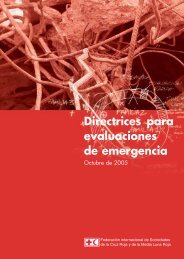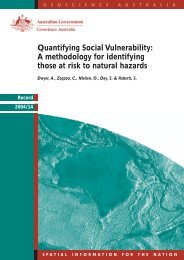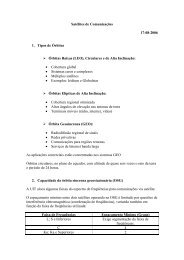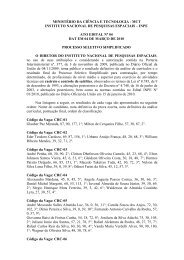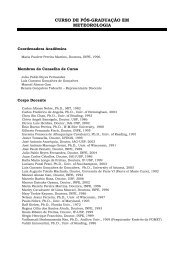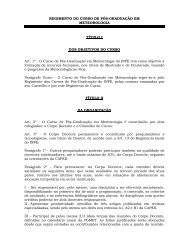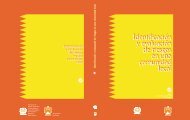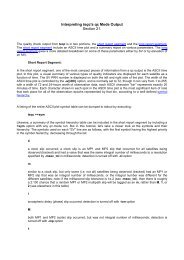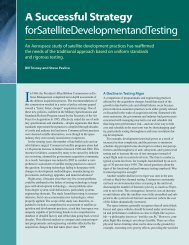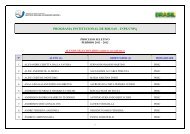Living with Risk. A global review of disaster reduction initiatives
Living with Risk. A global review of disaster reduction initiatives
Living with Risk. A global review of disaster reduction initiatives
Create successful ePaper yourself
Turn your PDF publications into a flip-book with our unique Google optimized e-Paper software.
dering external debts that constitute 181 per<br />
cent <strong>of</strong> its GNP. Under these conditions, it is<br />
unrealistic to expect significant investments at<br />
household or national level to mitigate the<br />
impact <strong>of</strong> natural or other threats.<br />
Globalisation as a dynamic force<br />
Globalisation has a number <strong>of</strong> distinctive<br />
characteristics that have had a pr<strong>of</strong>ound influence<br />
on the structure <strong>of</strong> international socioeconomic<br />
relations. The impact <strong>of</strong> <strong>global</strong>isation<br />
on patterns <strong>of</strong> vulnerability is critical to<br />
identify new trends in <strong>disaster</strong> risk. The economic<br />
dimensions <strong>of</strong> <strong>global</strong>isation include the<br />
dominance <strong>of</strong> a <strong>global</strong> market, as one <strong>of</strong> its<br />
main features. The combined impacts <strong>of</strong> economic<br />
adjustment measures to encourage<br />
greater efficiencies and <strong>global</strong> competitiveness<br />
have been reflected in significant job losses<br />
and unemployment. In South Africa alone,<br />
between 1996-2000 more than 500,000 formal<br />
sector jobs were lost. Between 1997-2000<br />
more than 140,000 miners became unemployed<br />
and 50,000 primarily female workers<br />
lost their jobs in textile industries. This is an<br />
increasingly relevant area which will require<br />
further analysis and focus.<br />
Traditional knowledge at risk<br />
<strong>Risk</strong> awareness and assessment<br />
The pace <strong>of</strong> technological change and the cultural<br />
implications <strong>of</strong> <strong>global</strong>isation pose a real<br />
threat to the wealth <strong>of</strong> local knowledge, and<br />
related skills and resources, preserved among<br />
indigenous people and in many rural communities.<br />
In the past, people from Pacific islands used various techniques<br />
to cope <strong>with</strong> the impact <strong>of</strong> natural hazards, such as<br />
special forms <strong>of</strong> food preservation, harvesting wild foods,<br />
planting <strong>disaster</strong>-resistant crops, using hazard-resistant forms<br />
<strong>of</strong> traditional house design and construction, and relying on<br />
established social networks for extended community support.<br />
Many <strong>of</strong> these traditions have become neglected as more<br />
people gravitate towards modern lifestyles, <strong>of</strong>ten becoming<br />
increasingly disassociated from a sensitive consideration <strong>of</strong><br />
natural conditions in the process. It has also been observed<br />
that crops which formerly provided food security in many<br />
countries at times <strong>of</strong> <strong>disaster</strong> are now rarely planted.<br />
Economic vulnerability is increasing as local<br />
livelihoods are transformed from relying on<br />
traditional forms <strong>of</strong> production to using more<br />
intensive or modern methods <strong>of</strong> agriculture<br />
and land use systems.<br />
2<br />
Traditional versus "modern" ways to cope. Is it necessary to choose?<br />
The traditional pattern <strong>of</strong> agricultural land use in the Sahel was well adapted to uncertain rainfall conditions. Generally<br />
speaking, the northern zone, <strong>with</strong> a mean annual rainfall <strong>of</strong> 100-350 mm was used for livestock, while the southern Sahel,<br />
<strong>with</strong> a rainfall <strong>of</strong> 350-800mm, was used for rain fed crops. This system permitted a degree <strong>of</strong> flexible inter-dependence.<br />
Herders followed the rains by seasonal migration, while the cultivators grew a variety <strong>of</strong> drought-resistant subsistence<br />
crops, including sorghum and millet, to reduce the risk <strong>of</strong> failure. Fallow periods were used to rest the land for perhaps as<br />
much as five years in order to maintain the fertility <strong>of</strong> the soil. In the absence <strong>of</strong> a cash economy, a barter system operated<br />
between herders and sedentary farmers.<br />
During recent decades this system has collapsed for a variety <strong>of</strong> reasons. Population growth has exerted pressure on the<br />
land, resulting in soil erosion. In turn, the range-lands have been over-grazed <strong>with</strong> rapid degradation <strong>of</strong> the resource base.<br />
The need <strong>of</strong> national governments for export earnings and foreign exchange has produced a trend towards cash crops,<br />
which have competed for land <strong>with</strong> basic grains and reduced the fallowing system. Subsistence crops have been discouraged<br />
to the extent that produce prices have consistently declined in real value for over twenty years. At the same time, the<br />
build-up <strong>of</strong> food reserves has been seriously neglected under pressure from international banks wanting loan re-payments.<br />
In addition, a lack <strong>of</strong> government investment to improve the productivity <strong>of</strong> rain-fed agriculture and a failure to organize<br />
credit facilities for poor farmers have also tended to undermine the stability <strong>of</strong> the rural base.<br />
National governments have progressively campaigned against a nomadic lifestyle. In many instances, foreign aid has been earmarked<br />
for sedentary agriculture rather than herders. Increasingly, strict game preservation laws have been introduced which<br />
restrict the possibility <strong>of</strong> hunting for meat during drought. Traditional forms <strong>of</strong> employment, such as in caravan trading, have<br />
declined as a result <strong>of</strong> the enforcement <strong>of</strong> international boundaries and customs duties, together <strong>with</strong> competition from lorries.<br />
Source: K. Smith, 1997<br />
65



